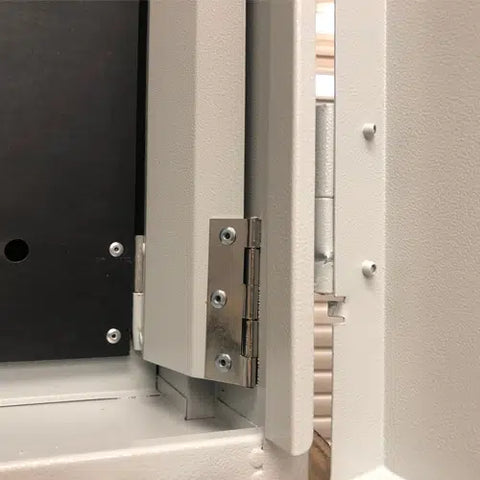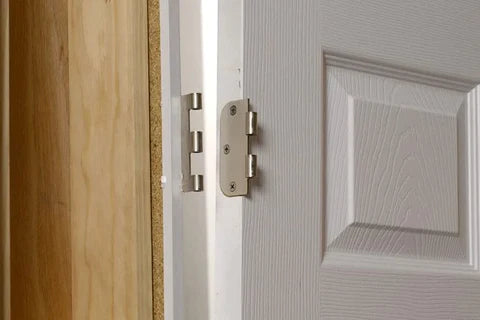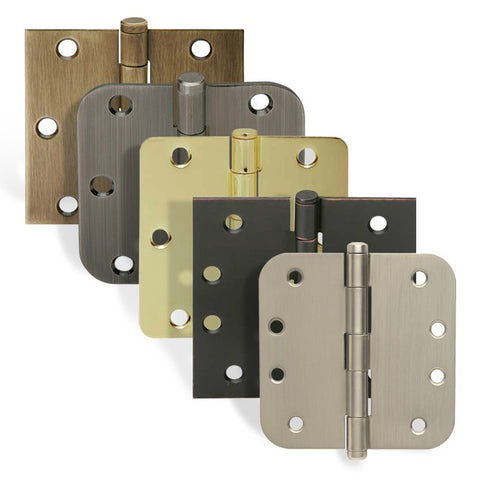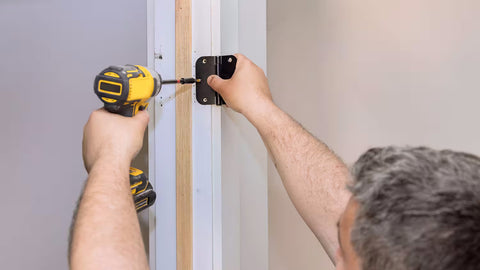
Easy Bathroom Door Upgrades Await: Find the Best Hinges Online!
Your bathroom door might not be the first thing you think about when considering home upgrades, but it's a vital element in both functionality and aesthetics. Whether you're aiming to refresh the look of your bathroom or simply improve its performance, upgrading your door hinges can make a significant difference. In this guide, we'll explore the importance of door hinges, discuss common issues, and provide tips on finding the best hinges online to elevate your bathroom experience.
Why Hinges Matter

Hinges might seem like a small component of your bathroom door, but they play a crucial role in its functionality. A sturdy and well-installed hinge ensures smooth operation every time you open or close the door. Additionally, hinges contribute to the overall stability and security of the door. Over time, wear and tear can cause hinges to deteriorate, leading to problems such as squeaking, sticking, or even misalignment. Upgrading your hinges can eliminate these issues and enhance the performance of your bathroom door.
Common Issues with Bathroom Door Hinges

Before diving into the world of hinge upgrades, it's essential to identify the common problems associated with bathroom door hinges:
Squeaking and Creaking: One of the most common problems with bathroom door hinges is squeaking or creaking noises when the door is opened or closed. This issue often occurs due to a lack of lubrication or loose components within the hinge mechanism. Squeaking hinges can be irritating and may indicate the need for maintenance or adjustment.
Binding or Sticking: Binding or sticking is another prevalent issue with bathroom door hinges. When hinges bind or stick, it becomes challenging to open or close the door smoothly. This problem can result from a warped door or frame, accumulated debris in the hinge mechanism, or loose hinges. Binding hinges can be frustrating and may require adjustments or repairs to resolve the issue.
Loose or Wobbly Hinges: Over time, bathroom door hinges may become loose or wobbly, affecting the stability of the door. Loose hinges can result from wear and tear, improper installation, or the weight of the door and hardware. Wobbly hinges compromise the door's functionality and may pose a safety risk if not addressed promptly.
Rust and Corrosion: In humid environments like bathrooms, metal hinges are susceptible to rust and corrosion over time. Rusty hinges not only detract from the door's appearance but can also impact its performance. Rust and corrosion occur due to prolonged exposure to moisture, poor ventilation, or the use of harsh cleaning chemicals. Rusty hinges may require replacement to ensure proper door operation.
Finding the Best Hinges Online

Now that you're aware of the importance of hinges and the common issues associated with them, it's time to explore how to find the best hinges online for your bathroom door upgrade:
Research and Compare: Before making a purchase, take the time to research and compare different hinge options available online. Look for reputable websites or online retailers that specialize in door hardware and offer a variety of hinge styles, sizes, and finishes. Read product descriptions, specifications, and customer reviews to gain insights into the quality and performance of the hinges.
Consider Your Requirements: Consider your specific requirements when choosing hinges for your doors. Determine factors such as the type of door (e.g., interior door, exterior door, cabinet door), the material of the door (e.g., wood, metal), and the desired functionality (e.g., self-closing hinges, concealed hinges). Additionally, consider the aesthetic preferences and overall style of your space to ensure that the hinges complement the existing decor.
Quality and Durability: When purchasing hinges online, prioritize quality and durability to ensure long-term performance and reliability. Look for hinges made from high-quality materials such as stainless steel, brass, or zinc alloy, which offer superior strength and corrosion resistance. Check for product warranties or guarantees to ensure peace of mind and confidence in your purchase.
Choose the Right Type of Hinge: There are various types of hinges available online, each designed for specific applications and functionality. Some common types of hinges include butt hinges, concealed hinges, pivot hinges, and self-closing hinges. Consider the type of door and its intended use when selecting the appropriate hinge type. Pay attention to factors such as door weight, size, and clearance requirements to ensure compatibility and proper installation.
Check Dimensions and Specifications: Before adding hinges to your online shopping cart, carefully review the dimensions and specifications provided by the manufacturer. Pay attention to details such as hinge size, hole pattern, and weight capacity to ensure that the hinges will fit your door and meet your requirements. Verify compatibility with existing hardware or door components to avoid compatibility issues.
Read Customer Reviews: Customer reviews can provide valuable insights into the quality, performance, and reliability of hinges available online. Take the time to read reviews from other customers who have purchased and used the hinges you're considering. Pay attention to feedback regarding product durability, ease of installation, and overall satisfaction to make informed purchasing decisions.
Check Shipping and Return Policies: Before completing your purchase, review the shipping and return policies of the online retailer to understand delivery times, shipping costs, and return procedures. Ensure that the retailer offers secure packaging and reliable shipping methods to prevent damage during transit. Familiarize yourself with the return process in case you need to exchange or return the hinges for any reason.
Installation Tips

Once you've selected the perfect hinges for your bathroom door upgrade, follow these installation tips for a smooth and hassle-free process:
Gather the Necessary Tools: Before beginning the installation process, gather all the tools and materials you'll need. This typically includes a power drill or screwdriver, a hammer, a chisel, screws or nails, a tape measure, and a pencil. Having everything prepared in advance will streamline the installation process and prevent delays.
Choose the Right Hinges: Ensure that you have selected the correct type and size of hinges for your doors. Consider factors such as the door material, weight, and size, as well as the desired functionality (e.g., standard hinges, self-closing hinges, concealed hinges). Verify that the hinges match the existing hardware and complement the overall aesthetic of the space.
Mark the Hinge Locations: Use a pencil and tape measure to mark the locations for the hinges on the door and door frame. Position the hinges evenly along the edge of the door, leaving a small gap between each hinge and the top and bottom edges of the door. Similarly, mark the corresponding locations on the door frame, ensuring that the hinges align properly when the door is closed.
Prepare the Door and Frame: Before installing the hinges, ensure that the door and door frame are properly prepared. If necessary, use a chisel to recess the hinge mortises into the door and frame, creating a flush surface for the hinges to sit. Test-fit the hinges to ensure they sit snugly in the mortises without protruding or sinking too deeply.
Install the Hinges: Secure the hinges to the door and door frame using screws or nails, depending on the hinge type and door material. Start by attaching the hinges to the door frame first, ensuring that they are aligned with the marked locations. Then, position the door in place and attach the hinges to the door using the same screws or nails. Use a level to ensure that the door hangs evenly and swings smoothly.
Check Alignment and Clearance: Once the hinges are installed, check the alignment and clearance of the door. Ensure that the door swings open and closed smoothly without binding or sticking. Verify that there is consistent clearance between the door and the frame along all edges. Make any necessary adjustments to the hinge positions or mortises to achieve optimal alignment and clearance.
Test the Door: After installing the hinges and adjusting the alignment, test the door to ensure proper functionality. Open and close the door several times to check for smooth operation and stability. Pay attention to any unusual noises, resistance, or misalignment, which may indicate issues with the hinge installation.
Secure the Hinge Pins: For added security, consider securing the hinge pins to prevent them from being removed easily. You can do this by tapping the bottom of each hinge pin with a hammer to create a slight indentation in the hinge barrel. Alternatively, you can insert a small nail or screw into the hinge pin hole to prevent it from being lifted out.
Apply Lubrication: Once the hinges are installed and tested, apply a small amount of lubricant to the hinge pins and moving parts to ensure smooth operation. Use a silicone-based or graphite lubricant specifically designed for door hinges, and wipe away any excess to prevent buildup.
Conclusion
Upgrading your bathroom door hinges might seem like a minor improvement, but it can have a significant impact on both functionality and aesthetics. By investing in high-quality hinges and following proper installation techniques, you can enhance the performance, stability, and appearance of your bathroom door. With a wide range of options available online, finding the best hinges for your needs has never been easier. Say goodbye to squeaky, sticking doors and hello to a smoother, more enjoyable bathroom experience!
